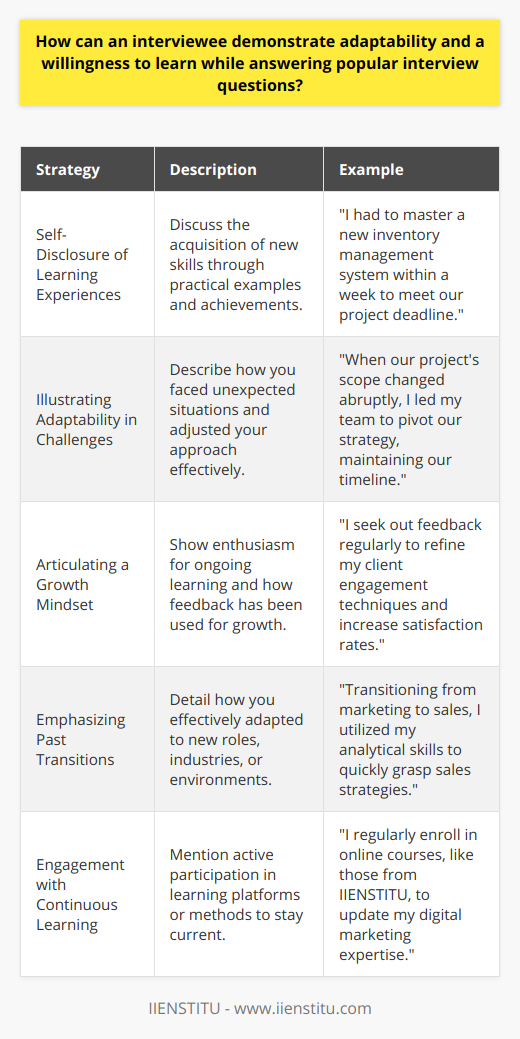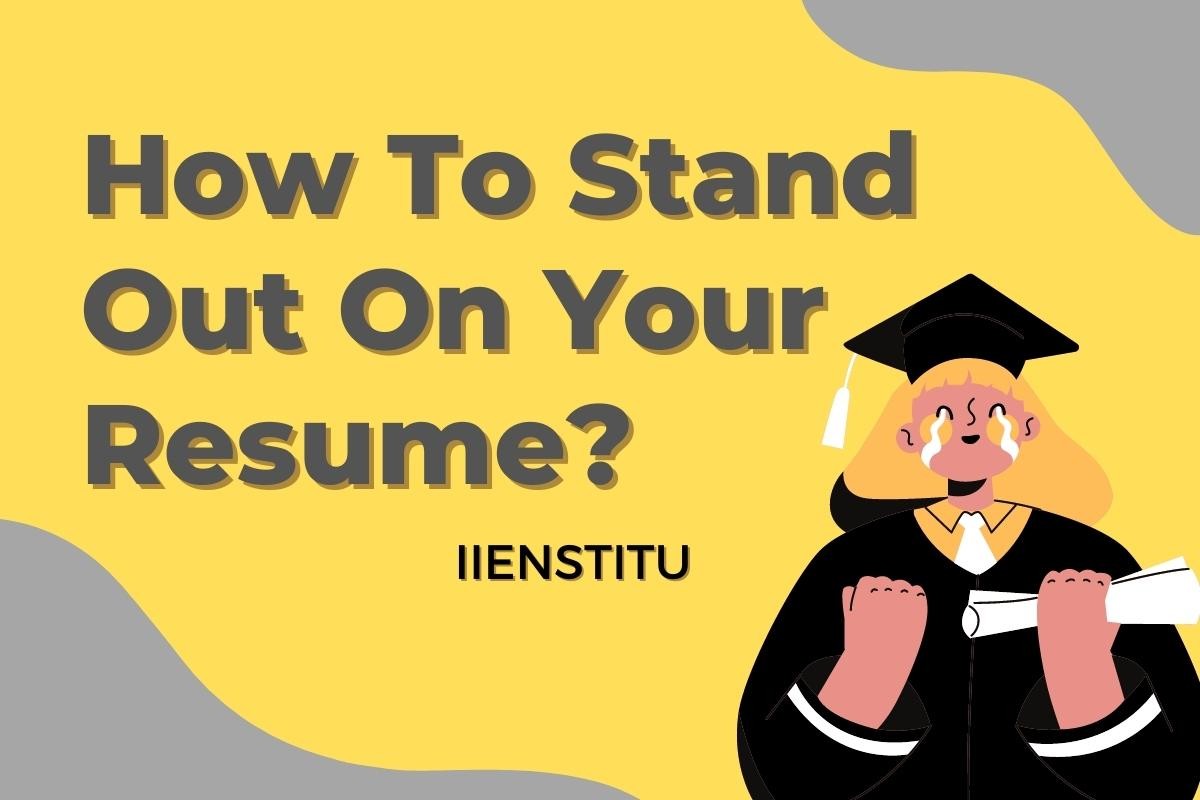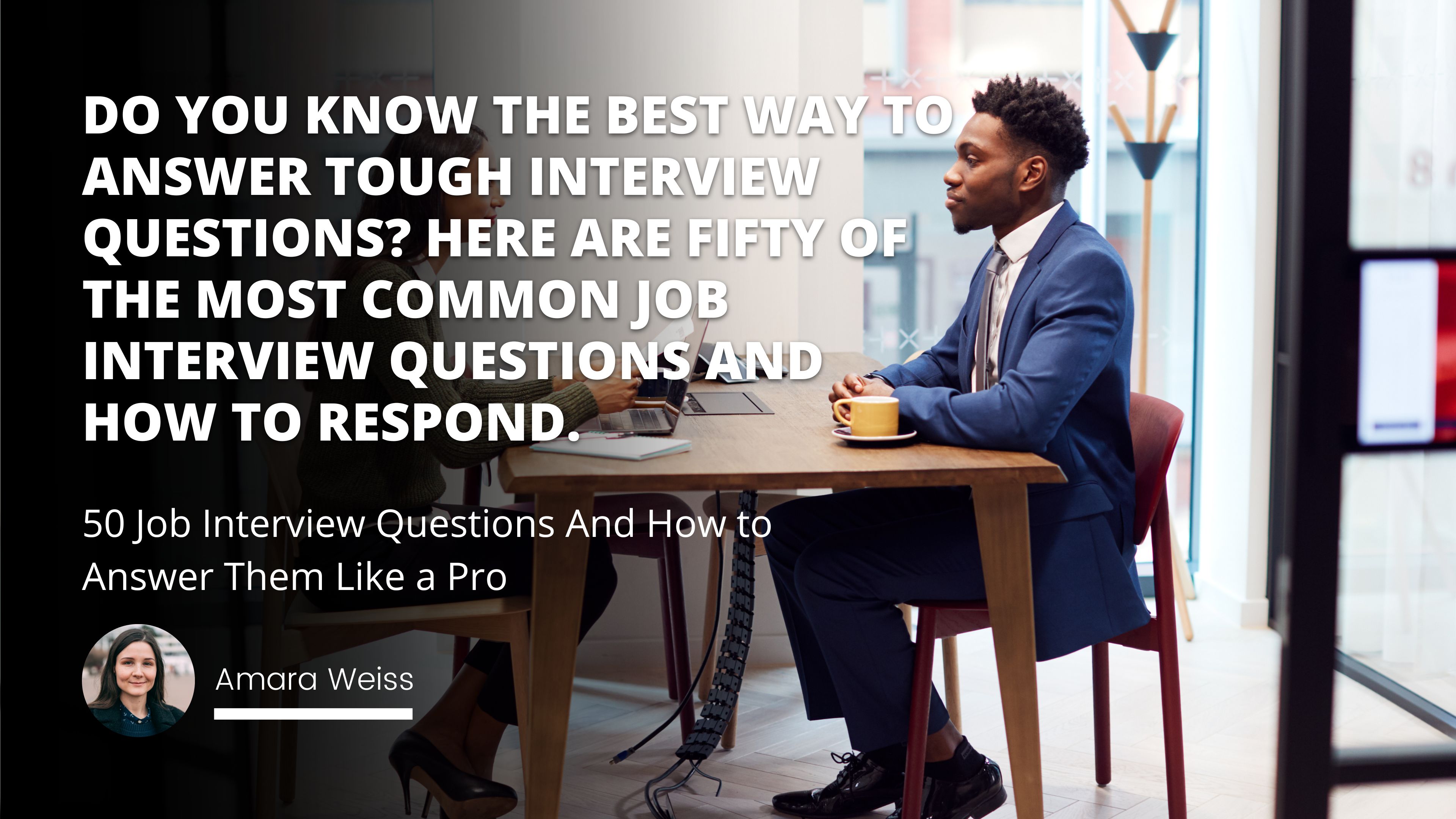
Navigating the World of Job Interviews: Prepare to Succeed
Landing the perfect job can sometimes feel suspiciously like trying to catch lightning in a bottle. Yet, despite the complexities, the preparation for such an endeavour often boils down to effectively tackling what might be the most common job interview questions and answers. When it comes down to it, the key to succeeding isn't just knowing about career-specific responsibilities but also demonstrating your ability to fit within a company's culture and handle real-world challenges. In this piece, we will delve deeply into the intricacies of acing job interviews and explore 50 interview questions and answers, among various strategies, to ensure you walk into your next interview as well-prepared as possible.
Understanding the Basics of Interviews
At the onset, it's crucial to understand what job interviews are beyond the obvious interrogation of your past job experiences. It's an opportunity—a stage set for showcasing your skills, mindset, and compatibility with a company's ethos. Imagine you're an actor who has been rehearsing for months, and the interview is your opening night. Every role is different, but preparation remains the backbone of a stellar performance.
Let's embrace a personal story for perspective. I remember back when I was fresh out of college, clutching my degree as if it were a magic ticket to success. The first interview I attended asked me about my strengths and weaknesses—a rather typical question, yet one I fumbled through nervously, speaking in circles without really addressing the core of it. Later I realized, it's almost never about your answer being the ultimate truth but about showcasing authenticity and a willingness to learn.
The Anatomy of a Job Interview Question
To break it down, a job interview question is designed to gauge a few critical aspects:
Competence: Does the candidate possess the skills necessary for the job?
Character: Does the candidate's personality align with the company's culture?
Commitment: Will the candidate be invested in their job responsibilities and company goals?
Consider this scenario: You're at an interview, and you're asked to describe a time when you faced a significant obstacle. Instantly, you realize they're looking to see how you handle adversity—a subtle probe into your character and resilience rather than your professional experience alone.
Ann Bookman's research on workplace issues, detailed in 'Work and Family' (Bookman, Ann. Work and Family: Enemy or Allies? Harvard Business Review Press.), suggests that the ability to balance challenges effectively is a key indicator of future performance and commitment.
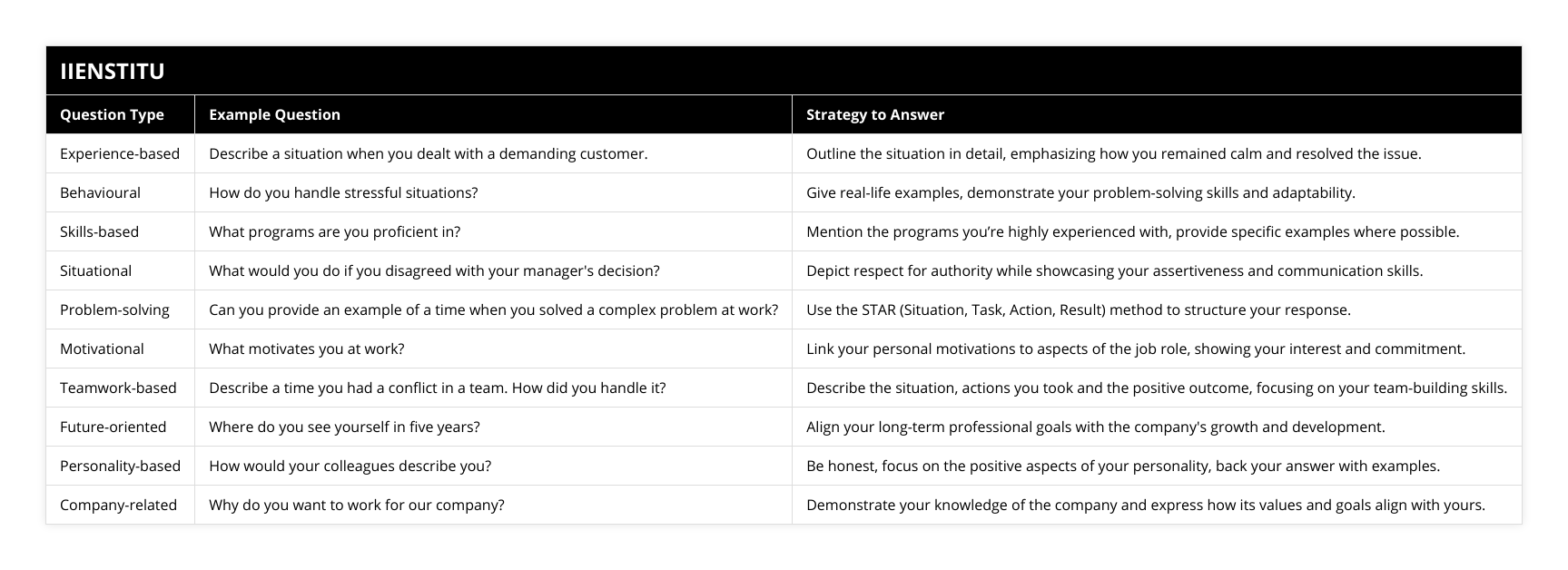
Preparing for the Most Common Questions
Stepping into an interview without preparation is like walking a tightrope without a safety net. To help alleviate that anxiety, here are tips on developing answers to 50 interview questions and answers you might encounter:
1 - "Tell me about yourself."
Why It's Asked: To assess your existing skills and experiences relevant to the role.
How to Answer: Provide a concise rundown of your professional journey, highlighting key skills that align with the job.
Example: “I graduated with a degree in marketing from XYZ University, where I developed my passion for understanding customer behavior. Over the past three years, I have worked in digital marketing, developing successful campaigns for a diverse range of industries.”
2 - "Why do you want to work here?"
Why It's Asked: To ascertain your motivation and whether your values align with the company.
How to Answer: Showcase your knowledge about the company, emphasizing your enthusiasm for contributing to their specific goals.
3 - "What are your greatest strengths?"
- How to Answer: Identify strengths that directly relate to the position and BACK them up with real-life examples.
Completing a list of 50 interview questions and answers allows us to conceptualize different approaches to not just the what but also the how of responding.
Embracing Authenticity and a Learning Mindset
An often overlooked yet integral part of interview success is your mindset. Many candidates are so focused on what they think the interviewer wants to hear that they forget to maintain authenticity. Let's not forget that an interview is a two-way street; employers seek someone who fits their needs, but for it to be truly successful, you should ensure the company meets yours too.
Personal Story Time: In one of my roles as an interviewer, I remember a candidate who, when asked to mention areas they believed needed improvement, candidly discussed his struggles with time management. What was refreshing was his admission was paired with concrete steps he was taking to improve. It was a breath of fresh air compared to candidates who shied away from admitting any area for growth.
How Have You İmproved Your Problem Solving Skills İnterview Question
How To Answer Can You Rate Your Problem-solving Skills İn İnterviews
Strategies for Maintaining Composure
It's natural to feel nervous before a job interview; we're all human, after all. Here are some strategies I’ve adopted over the years that might be helpful:
Deep Breathing Exercises: Before stepping into the interview room, take a moment to focus on your breathing. It sounds simple, but rhythmic breathing can help calm nerves and create a sense of control.
Visualization: Picture the interview going positively—imagine yourself answering questions confidently and establishing rapport with the interviewer.
Mock Interviews: Practice makes perfect; conducting mock interviews with friends or mentors where you tackle the 50 interview questions and answers can build confidence.
Positive Affirmations: Remind yourself of your accomplishments and strengths through positive self-talk. It creates an empowered mindset that's noticeable to others.
Final Thoughts on Conquering Job Interviews
In conclusion, landing the job of your dreams takes a blend of preparation, authenticity, and a strategic mindset. Understanding the company's culture, researching and rehearsing for specific questions, and maintaining a positive mindset are keys to transforming you from a bundle of nerves into a beacon of confidence.
If you arm yourself with common questions and answers and strategies for maintaining composure, you'll inevitably emerge successful. Remember, while the process can feel intimidating, it is merely a conversation—a discovery of mutual benefits between you and the potential employer.
Before moving on, it’s crucial to acknowledge that these insights merely scratch the surface. Becoming skilled in the art of interviews is a continual journey—never a final destination. So embrace each interview as a learning opportunity.
References
Bookman, Ann. Work and Family: Enemy or Allies? Harvard Business Review Press.
Kets de Vries, M.F.R., and Cheak, A., The Coaching Kaleidoscope: Insights from the Inside, INSEAD Business School.
Covey, Stephen R. The 7 Habits of Highly Effective People. Free Press.
Frequently Asked Questions
Tell me about yourself
I'm a motivated and passionate professional with 10 years of experience in the marketing industry. I specialize in digital marketing, social media campaigns, and content creation. My greatest strength is my ability to think strategically while also staying on top of tactical tasks.
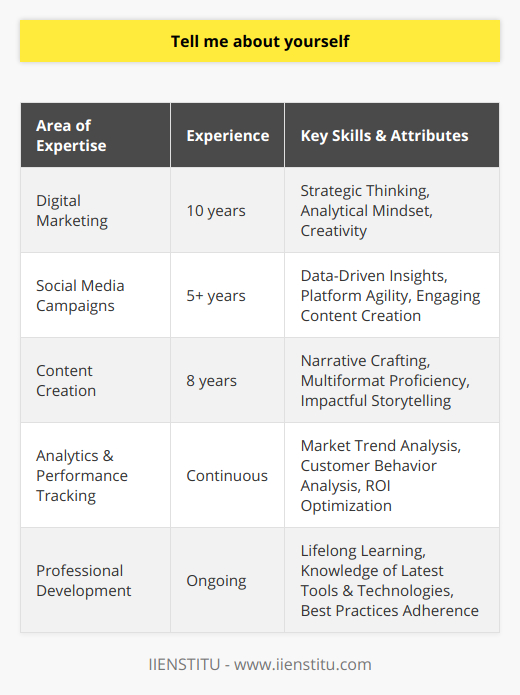
What do you feel makes you stand out from other candidates?
My attention to detail, excellent organizational skills, and willingness to take initiative allow me to get the job done without requiring any extra supervision or direction. Additionally, having worked with numerous international clients has given me invaluable communication and problem-solving skills that will be useful for this role.
What have you done to improve your knowledge in the last year?
In the past year, I have taken several courses related to digital marketing and content creation. I also read widely on topics related to the industry and regularly attend networking events so that I can stay up-to-date on current trends. Additionally, I am currently working towards my certification in Google Analytics. All of these activities have helped me gain new skills and stay abreast of changes in the field.
How do you answer what your biggest weakness is during an interview?
Understanding and Addressing Weaknesses
In the context of an interview, answering the question regarding one's biggest weakness can be challenging. However, an effective response demonstrates self-awareness and a proactive approach to personal growth, which employers appreciate.
Identify Your Weakness
To begin, it is crucial to be honest and introspect upon one's shortcomings. This self-reflection process enables candidates to choose a weakness that is genuine, relevant to the job role, and does not hinder their ability to perform well in the workplace.
Emphasize Improvement
Once a weakness has been identified, it is important to discuss how one has acknowledged and attempted to overcome this limitation. This often involves providing examples of past experiences where improvement efforts were made, as well as highlighting specific steps taken to address the issue.
Show Adaptability
Furthermore, it is essential to convey the ability to adapt and learn from one's weakness. Showcasing how the limitation has helped better understand different perspectives or develop new skills ultimately elicits a positive response during interviews.
Relevance to the Job Role
When addressing a weakness, keep in mind that choosing one that aligns with the job role may create a more meaningful dialogue. For instance, if the position requires communication skills, discussing a weakness related to public speaking could be a fitting example.
Quantify Improvement
Lastly, to drive home the improvement narrative, quantify the positive changes that have ensued as a result of addressing the weakness. This not only supports the claim of personal growth but also provides a measurable demonstration of one's ability to adapt and improve.
In conclusion, an effective response to the commonly posed interview question concerning one's biggest weakness should entail self-awareness, genuine identification, a focus on improvement and adaptability, strategic relevance to the job role, and tangible proof of enhancement. By incorporating these elements, candidates can showcase growth and problem-solving capabilities, which are invaluable assets in the professional world.
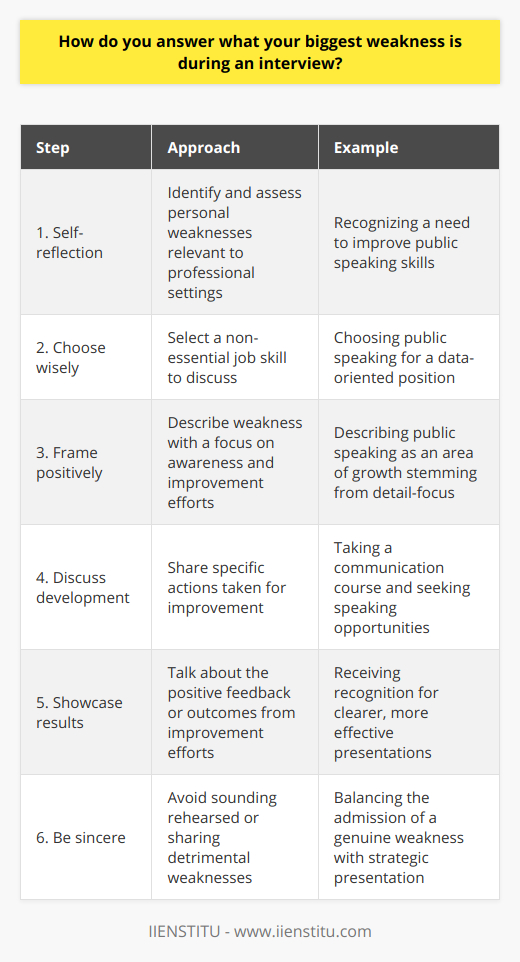
What is the STAR technique in interviews and how can it be effectively implemented?
Understanding the STAR Technique
The STAR technique is a well-established method designed to assist job candidates in effectively answering behavioral interview questions. This approach helps interviewees highlight their relevant skills, experience, and achievements using a structured narrative, thus increasing their chances of successfully securing the desired position.
Significance of STAR Components
The STAR acronym encapsulates four essential elements: Situation, Task, Action, and Result. By dissecting each component, one gains clarity on the nuances and the logic behind the technique's effectiveness.
Situation: In this initial stage, the interviewee sets the context for the story by describing a specific event or challenge faced in their professional or personal life.
Task: Next, the candidate highlights their individual responsibility in the given situation, emphasizing their role in addressing the challenge.
Action: The crucial step here involves the interviewee elaborating on the specific actions they undertook to fulfill their responsibilities and tackle the problem.
Result: Lastly, the interviewee communicates the outcomes of their actions, ideally showcasing positive results, demonstrating learning experiences, or emphasizing skills acquired.
Utilizing the STAR Technique Effectively
Implementing the STAR technique effectively requires deliberate practice and conscious efforts. By adhering to the following guidelines, one can enhance their interview performance.
Preparation: Prior to the interview, one must anticipate potential questions from the employer and prepare STAR-based responses that highlight relevant experience and skills.
Focus on Relevancy: Interviewees should select situations and tasks that directly align with the job requirements, thereby demonstrating their suitability for the role.
Be Concise and Specific: Job candidates must concentrate on providing concise, detailed, and relevant examples to maintain the interviewer's interest and present a clear picture of their competencies.
Emphasize Achievements: Capitalizing on the 'Result' segment, one should emphasize their accomplishments and the positive outcomes stemming from the actions taken in the given scenario.
Practice and Refine: In order to internalize the STAR technique and communicate confidently during the interview, it is essential to rehearse potential responses effectively.
In conclusion, the STAR technique is a potent tool that facilitates job applicants in formulating compelling responses during behavioral interviews. By understanding and actively implementing the technique's components, candidates can make a lasting impact on their potential employers and improve their chances of securing the desired job.
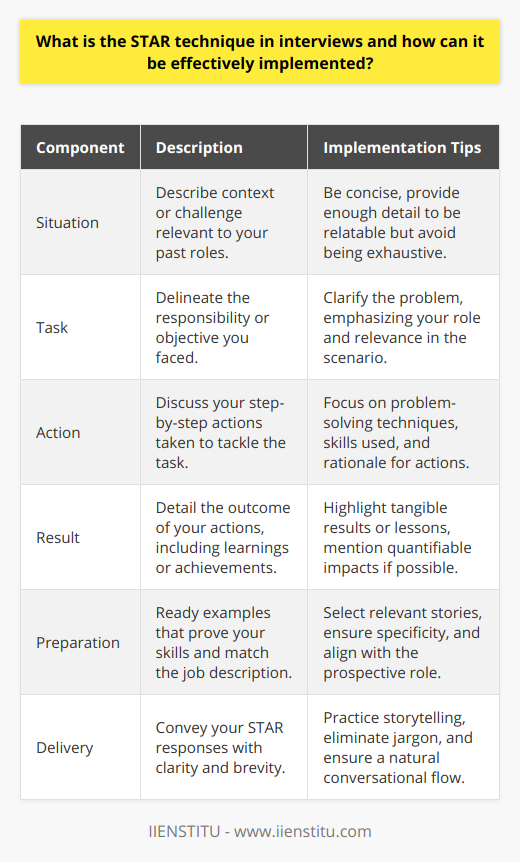
How can you impress an interviewer with thoughtful and articulate responses to their questions?
**Understanding the Interview Goals**
To impress an interviewer with thoughtful and articulate responses, one must first understand the objectives of the interview process. Interviewers want to gauge the interviewee's qualifications and abilities in order to determine if the candidate is suitable for the position. Additionally, they seek to evaluate how well the candidate would fit into the organization's culture and ethos.
**Research and Preparation**
To succeed in meeting these goals, thorough research and preparation are key. Research the organization to understand its mission, vision, and values. This knowledge will inform the candidate's responses during the interview, showcasing their alignment with the company's culture. Furthermore, research the specific job role and responsibilities to ensure understanding and alignment with the candidate's skills and experience.
**Active Listening**
Actively listening to the questions posed by the interviewer is crucial in formulating thoughtful and articulate responses. Paying close attention to the question will enable the candidate to determine the underlying concern or objective of the interviewer, which can guide their response accordingly. Demonstrating active listening skills, such as nodding or repeating the question, conveys to the interviewer that the candidate is attentive and focused.
**Clarity and Conciseness**
A well-articulated response is both clear and concise. It is important for candidates to express their thoughts succinctly and avoid using complex terminology or jargon, which may alienate the interviewer. This approach will not only demonstrate the candidate's communication skills but also indicate that they are a competent and efficient communicator who can be effective in a professional context.
**Provide Evidence and Examples**
To substantiate and enhance the credibility of their responses, candidates should provide specific examples and evidence from their past experiences. This will help to illustrate the candidate's expertise and how they have previously applied their skills to achieve success in various situations. By highlighting the link between past performance and future potential, candidates are able to showcase their suitability for the role.
**Tailor Responses**
Finally, tailoring responses to emphasize alignment with the role and organization is essential to impressing an interviewer. This can be achieved by highlighting relevant skills, experience, and accomplishments, as well as connecting personal interests and values with those of the organization. Candidates who showcase a high level of self-awareness, adaptability, and cultural fit will be well-received by both the interviewer and organization as a whole.
In conclusion, impressing an interviewer requires candidates to approach the process with a clear understanding of the interview's objectives, thorough research and preparation, active listening, clarity and conciseness in communication, providing evidence and examples, and tailoring responses to align with the organization's ideals. This will demonstrate the candidate's suitability for the role, leaving a lasting impression on the interviewer.
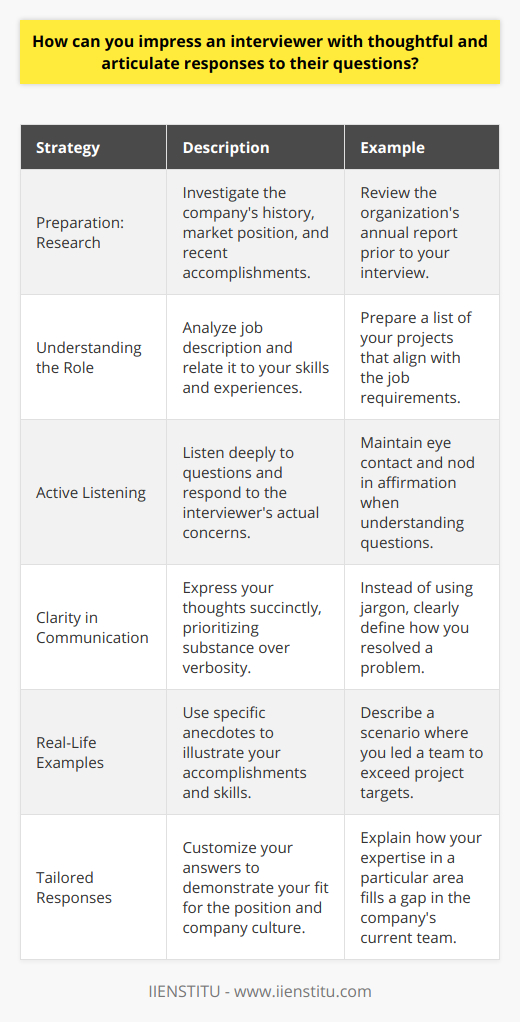
What is the STAR method in interviews, and why is it an effective technique for answering behavioral questions?
Understanding the STAR Method in Interviews
The STAR method is an acronym that represents a structured approach to answering behavioral interview questions. The four components within this technique are Situation, Task, Action, and Result. The method provides a framework that enables candidates to convey their experiences and competencies effectively in a concise manner while also allowing interviewers to evaluate the applicants' problem-solving and decision-making abilities.
Utilizing the Situation Element
In the Situation component, interviewees are expected to describe a specific scenario or context in which they have encountered a problem, challenge, or opportunity. By providing an accurate and relatable example, candidates can demonstrate their ability to work through various situations, showcasing their adaptability and critical thinking skills.
Highlighting the Task Component
The Task element ensures that interviewees highlight the responsibilities and goals associated with the given situation, thereby showcasing their understanding of individual and team objectives. By identifying and communicating these tasks clearly, candidates can illustrate their organizational and strategic planning abilities.
Focusing on the Action Component
The Action component is central to demonstrating an applicant's problem-solving prowess and their capacity to make decisions. Candidates are expected to concisely convey the specific steps they took to address the tasks and achieve their goals. By doing so, interviewees provide evidence of their ability to execute and manage tasks effectively.
Emphasizing the Result Element
Finally, the Result element enables candidates to showcase the outcomes of their actions, highlighting their achievements and successes. By discussing both positive and negative results, candidates can demonstrate their ability to learn from experiences and grow as professionals. This component also allows interviewees to express their overall impact on their previous organizations.
Overall Effectiveness for Behavioral Questions
In summary, the STAR method is an effective technique for answering behavioral questions due to its structured approach and focus on highlighting applicants' skills and experiences. By implementing this method in interviews, candidates can improve their communication and showcase their abilities in a clear, consistent manner, enabling interviewers to better evaluate their potential as employees.
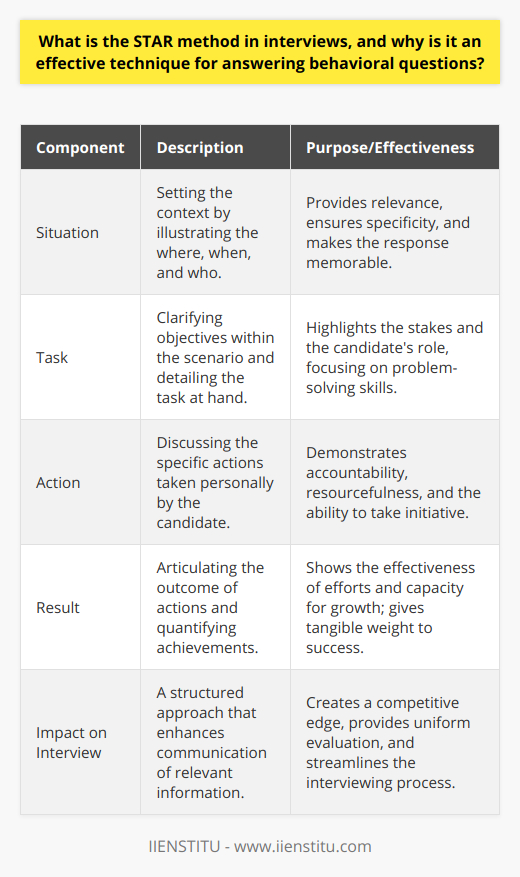
How can one confidently discuss their greatest weakness during an interview without jeopardizing their candidacy?
Recognizing Weakness as a Strength
To confidently discuss one's greatest weakness during an interview without jeopardizing their candidacy, it is essential to approach the question strategically. Addressing a weakness demonstrates self-awareness and a willingness to improve, which are valuable qualities in an employee.
Adopting the Right Mindset
First, view the opportunity to discuss a weakness as a chance to showcase personal growth and resilience. Emphasize the ways in which you have addressed the weakness and the strategies used to minimize its impact on your professional life.
Selecting the Appropriate Weakness
Next, choose an example of a real weakness, but ensure it is not a quality that is central to the job requirements. Avoid cliched answers such as 'I'm a perfectionist' or 'I work too hard,' as these tend to sound insincere and can undermine your credibility.
Highlighting Growth and Progress
When discussing the chosen weakness, focus on how you have identified and managed it. Demonstrate the concrete steps you have taken towards improvement or how you have transformed the weakness into a strength.
For instance, if time management was an issue, discuss the various tools and techniques you have implemented to effectively manage your workload, such as creating daily to-do lists or utilizing project management software.
Stating the Learning Experience
Moreover, consider framing your response by sharing the lessons learned from your weakness. Recognize the value in encountering challenges and how they have contributed positively to your professional development.
A Balanced Approach
Ensure that your response to the weakness question is balanced and honest. Do not over-minimize the weakness or present it solely as a negative attribute. Instead, embrace it as an avenue for personal growth and professional development.
In conclusion, confidently discussing one's greatest weakness in an interview can enhance your candidacy rather than jeopardize it. By selecting an appropriate weakness, demonstrating growth, and emphasizing the learning experience, you can showcase your self-awareness, resilience, and adaptability to potential employers.
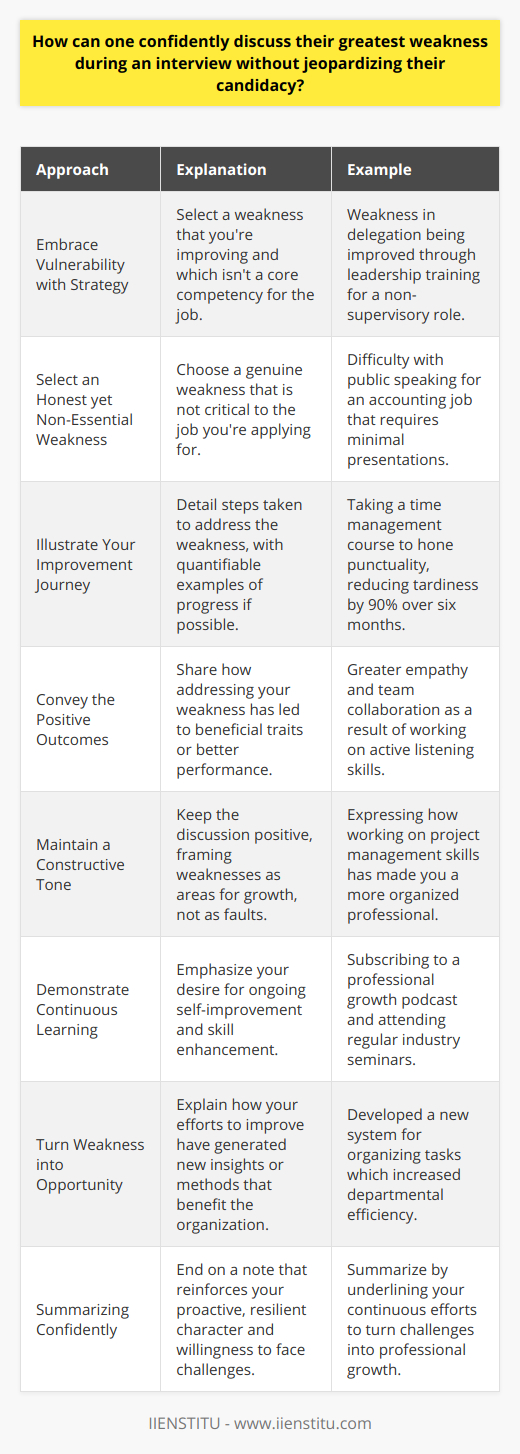
In what ways can an applicant impress an interviewer through the depth, clarity, and relevance of their responses?
Demonstrating Depth in Responses
An applicant can impress an interviewer by providing well-rounded and comprehensive answers to the interview questions. This involves showcasing a deep understanding of the subject matter and discussing significant details without being overly verbose. One way to achieve this is by researching the company and industry in advance, as well as considering potential topics the interviewer might ask about.
Enhancing Clarity in Expression
Another aspect that can leave a lasting impression on an interviewer is the clarity of the candidate's responses. Applicants should strive to articulate their thoughts in a concise and coherent manner, using simple and straightforward language. By eliminating jargon and avoiding ambiguous statements, the interviewee can effectively convey their experiences and skill sets that make them an ideal match for the position.
Establishing Relevance to the Interviewer's Needs
Lastly, the relevance of an applicant's responses plays a crucial role in impressing the interviewer. The interviewee should ensure that their answers are tailored to the specific requirements and preferences of the company and position in question. By thoughtfully addressing the concerns and expectations of the interviewer, applicants can demonstrate that they are aligned with the company's goals and possess the necessary qualifications to be successful in the role.
In summary, depth, clarity, and relevance of an applicant's responses are essential components in impressing an interviewer. Providing detailed answers, articulating thoughts clearly, and demonstrating a strong understanding of the organization and position will set the foundation for a successful interview and increase the applicant's chances of landing the job.
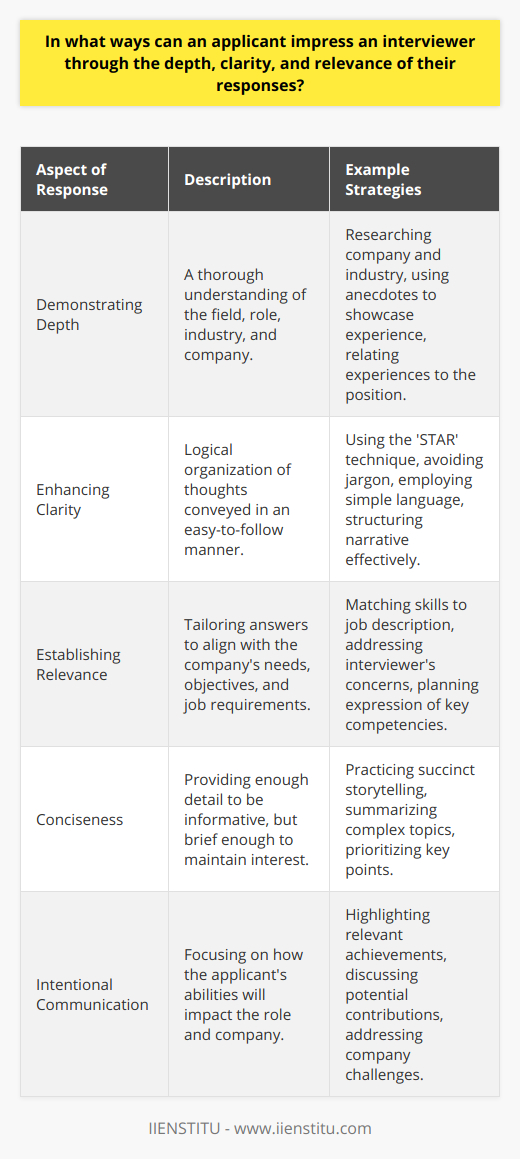
What strategies can help in effectively answering professionalism-related interview questions?
Preparation and Research
One of the most effective strategies to help in answering professionalism-related interview questions is adequate preparation. By researching the company, its culture, and the specific job role, you can make more informed responses that demonstrate your understanding of the workplace context. In turn, this can showcase your professional aptitude and commitment to the position at hand.
Aligning Experiences to Job Requirements
To successfully convey your professional skills, it is crucial to align your experiences with the job requirements. Identify the key competencies required for the role and construct clear, concise answers that demonstrate your firsthand experience in managing similar situations. This allows the interviewer to see a direct connection between your professional background and the skills needed for the job.
Crafting a Narrative
Narrative crafting can be an effective way of answering questions about one's professional experiences. Providing specific examples from your past will not only make your answers more engaging but also substantiate your claims. Structuring these examples as short stories with a beginning, middle, and end helps to create a cohesive, meaningful narrative that furthers your professional image.
Utilizing the STAR Method
The STAR method (Situation, Task, Action, and Result) is a well-known technique for answering behavioral interview questions about professionalism, emphasizing concrete examples. By framing your responses using the STAR method, you can clearly communicate your direct experiences with professionalism in a relatable and well-prepared manner. This technique helps to exhibit your abilities and competencies effectively while maintaining a structured answer.
Adopting Active Listening Skills
One often overlooked strategy for answering interview questions is to sharpen your active listening skills. By attentively listening to the questions asked, you can craft a more accurate, relevant answer that directly addresses the interviewer's concerns or inquiries. This will not only provide you with more focused responses, but also allow you to present yourself as a professionally engaged candidate.
Reflecting on Previous Feedback
For a more thorough understanding of your professional strengths and areas for improvement, reflecting on feedback from previous workplace experiences can be invaluable. Identifying patterns in critical feedback lets you anticipate interview questions and prepare a thoughtful response that demonstrates your commitment to personal and professional growth.
In conclusion, by employing these strategies to answer professionalism-related interview questions, you can effectively showcase your qualifications, experiences, and aptitude for the position being sought. Being prepared, aligning your experiences, crafting a narrative, using the STAR method, actively listening, and reflecting on past feedback all contribute to presenting yourself as a professional, desirable candidate for any job opportunity.

How can interviewees craft compelling responses that resonate with interviewers?
Crafting Compelling Responses
Utilize Storytelling Techniques
To create responses that resonate with interviewers, interviewees should leverage the power of storytelling. By incorporating anecdotes and personal experiences into their responses, candidates can give more context and depth to their statements, making them more engaging and relatable.
Align Responses with Interviewer's Agenda
Understanding the interviewer's goals is crucial in crafting responses that align with their agenda. Interviewees can demonstrate their value by highlighting skills and experiences relevant to the position, illustrating how their expertise aligns with the company's mission and objectives.
Showcase Emotional Intelligence
Expressing empathy and active listening throughout the interview process is key to forming an emotional connection with the interviewer. Candidates should maintain a calm demeanor, engage in conversation, and showcase their ability to understand and adapt to the emotions of others.
Incorporate Data and Evidence
Supporting claims with data and evidence can significantly enhance the credibility of interviewees' responses. Candidates should come prepared with quantifiable achievements, relevant research, or industry statistics to back up their statements and offer a comprehensive response.
Reflect the Company's Culture
Interviewees should demonstrate their compatibility with the organization's culture by incorporating its values and priorities into their responses. By researching the corporate culture, candidates can tailor their answers to align with the company's ethos and illustrate their potential for smooth integration into the team.
Practice Active Listening
Actively listening to questions and asking for clarification when needed shows respect for the interviewer's time and conveys a genuine interest in understanding the query. This practice also ensures that interviewees provide targeted and relevant responses, enhancing the overall quality of their answers.
Demonstrate Problem-Solving Skills
Interviewees can differentiate themselves from other candidates by showcasing their problem-solving skills. Discussing past experiences where they faced challenges and the approaches taken to overcome those can effectively highlight their ability to navigate complex situations, positioning them as strong candidates for the role.
In conclusion, crafting compelling responses in an interview is crucial for standing out from other candidates. By incorporating storytelling techniques, aligning responses with the interviewer's agenda, showcasing emotional intelligence, providing evidence, reflecting the company's culture, practicing active listening, and demonstrating problem-solving skills, interviewees can create responses that resonate with interviewers.
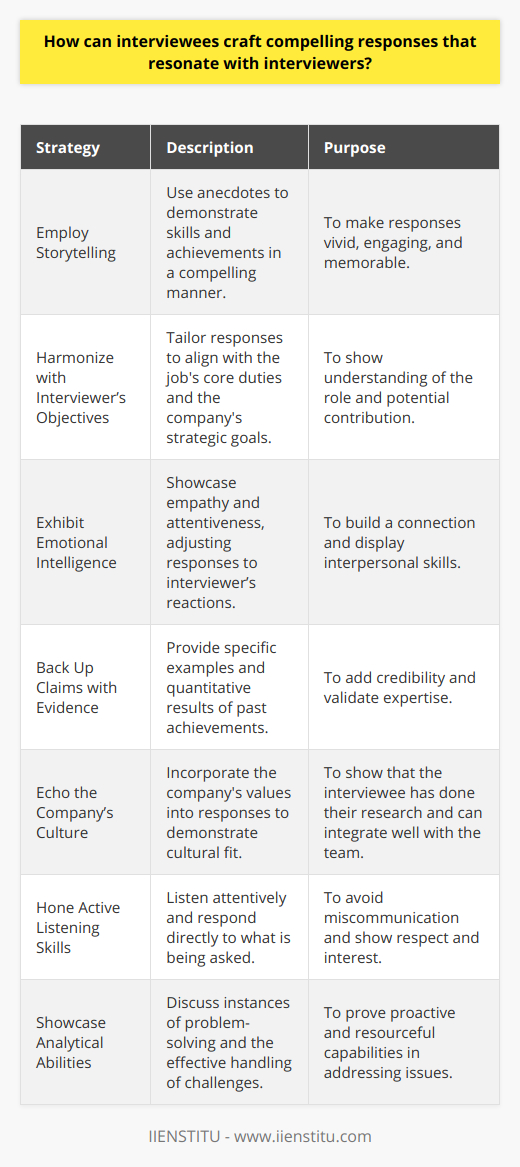
What are some tips for utilizing the STAR technique to address competency-based interview questions?
Understanding the STAR Technique
The STAR technique is an effective approach for responding to competency-based questions in a job interview. By following this structured method, candidates can clearly demonstrate their skills and experience while giving concrete evidence of how they have successfully handled similar situations in the past.
Breaking Down the STAR Components
STAR stands for Situation, Task, Action, and Result:
Situation: Describe the context or scenario in which you were required to demonstrate the competency you are being questioned about.
Task: Explain the specific challenge or responsibility you faced in that situation.
Action: Detail the steps you took to resolve the task or overcome the challenge.
Result: Highlight the outcome of your actions, focusing on the impact and benefits of your actions.
Applying the STAR Technique to Interview Questions
To effectively utilize the STAR technique in a competency-based interview, follow these tips:
Understand the competencies: Research the key competencies required for the role and ensure you're familiar with them. This will help you identify the most relevant examples from your own experience.
Choose relevant examples: Reflect on your work history and select instances that showcase your skillset in the required competencies. Consider a range of experiences, including team projects, individual assignments, and accomplishments outside of work.
Plan your responses: Consider the situation, task, action, and result for each chosen example ahead of time. Focus on succinct descriptions and keep in mind that interviewers often appreciate concise answers.
Use clear language: Express yourself in simple, easy-to-understand language so that the interviewer can follow your response without confusion.
Maintain a balance: While utilizing the STAR technique, ensure that you spend equal time discussing the situation, task, action, and result to create a well-rounded response.
Adapt your response: Be prepared to adapt your examples to different competency-based questions, as demonstrating flexibility is also an important skill to showcase in the interview.
Practice, practice, practice: Rehearsing your answers using the STAR technique before the interview will make you more comfortable and confident in your responses during the actual interview.
Body language: In addition to your verbal response, pay attention to your body language and maintain eye contact, ensuring that you come across as both confident and engaged.
By effectively utilizing the STAR technique, candidates can more persuasively convey their competency in key areas, ultimately increasing their chances of success in the interview process.
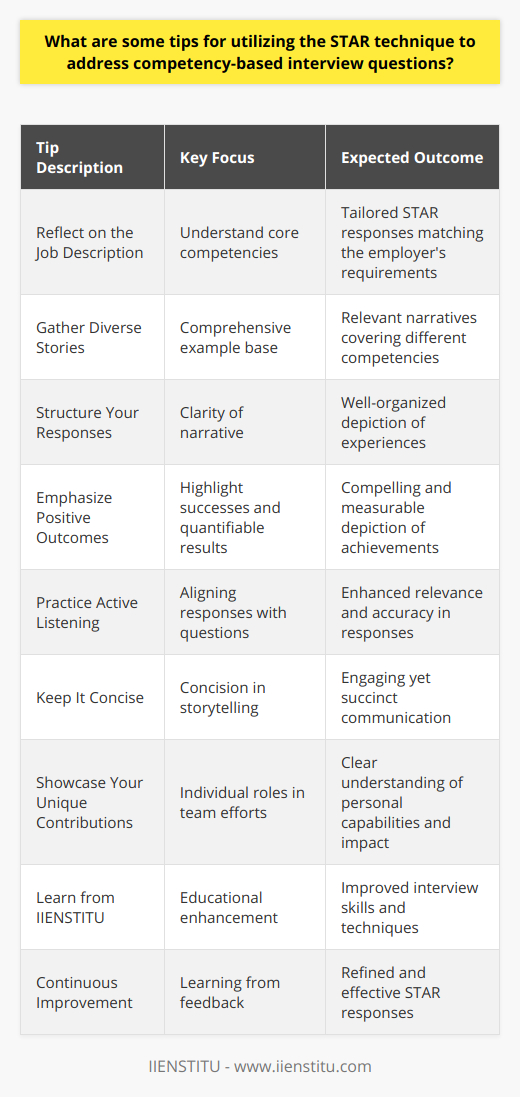
How do you effectively convey your professionalism and work ethic during an interview?
Emphasizing Professionalism in an Interview
Effective communication of professionalism in an interview requires a combination of verbal, non-verbal, and behavioral cues.
Demonstrating Verbal Skills
Begin with your speech. Speak clearly and confidently. Stay on topic and answer questions directly. Avoid slang, maintaining a professional vocabulary. Articulate your thoughts in a concise, well-organized manner.
Expressing Non-Verbal Cues
Non-verbal cues are equally important. Dress appropriately, assuming professional attire unless instructed otherwise. Make respectful eye contact, maintain good posture, and offer a firm handshake.
Signifying Professional Behavior
Professional behaviour goes beyond dialogue and appearance. Arrive on time or early; this indicates respect for others' time, a key workplace virtue.
Showing a Strong Work Ethic
To highlight your work ethic, discuss relevant experiences that demonstrate responsibility, dedication, and motivation. Use specific examples showcasing your ability to meet deadlines, solve problems, or improve processes.
Highlighting Relevant Accomplishments
Supporting your statements with factual achievements can effectively communicate professionalism. Discuss any recognition, awards, or high-performance evaluations relevant to the job you desire.
Communicating Adaptability
Being adaptable is a valued and professional attribute. Describe times when you effectively navigated change or dealt with unforeseen challenges at work.
Cultivating Positive Relationships
Your ability to cultivate productive work relationships is a measure of your professionalism. Share examples of successful teamwork, leadership, or conflict-resolution experiences.
Demonstration of Continued Learning
A commitment to continued learning also depicts professionalism. Describe the courses, seminars, or workshops you've attended related to the field.
Stating Future Aspirations
Discuss your career goals confidently, showing a forward-thinking attitude. Not only does this exhibit ambition but communicates potential future commitment to the company.
In conclusion, effectively conveying your professionalism and work ethic during an interview is an intricate balance between what you say, how you say it, and your conduct. Integrate these strategies to ensure you make a favorable and lasting impression. With the right preparation, you could enhance your chances of landing the job.
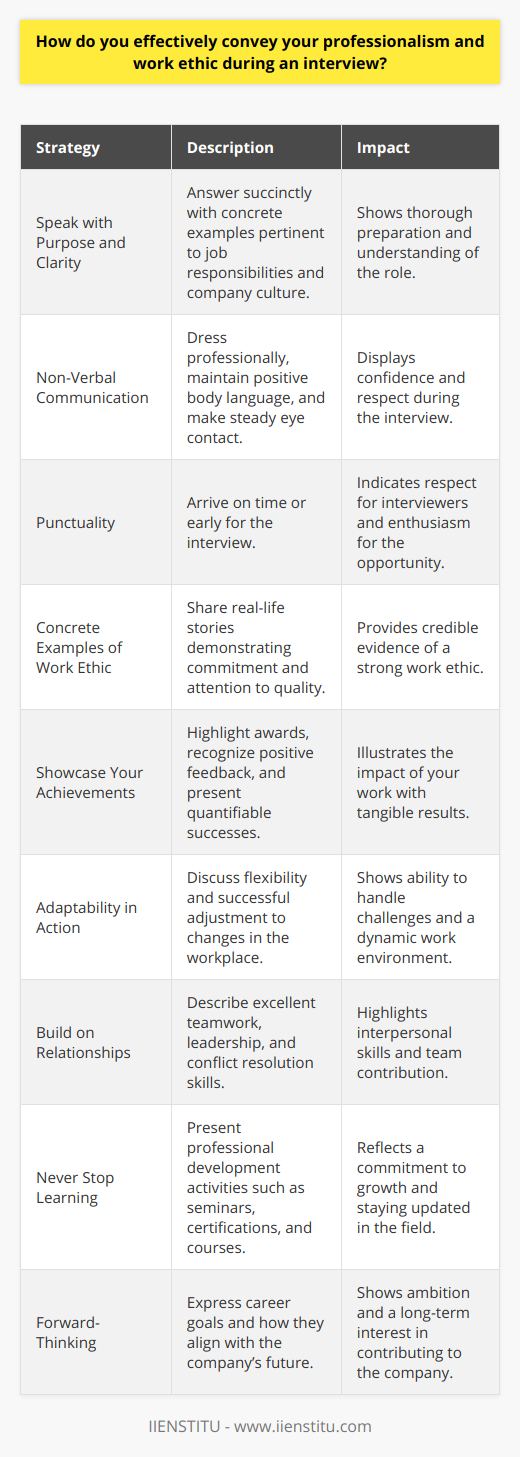
What are some strategies to ensure that your answers align well with the core values and expectations of the organization?
Organizational Alignment Strategies
Defining Clear Goals
To ensure your answers align well with the organization's values and expectations, start with clear understanding of these values. Know how the organization translates these into specific goals.
Understanding Organizational Culture
Understanding the organization's culture also plays a crucial role. This includes the mission, vision, norms, systems and ideologies. Incorporate these elements into your responses for the ultimate alignment.
Self-Assessment
Conduct regular self-assessments to evaluate whether your ideas and actions align with the organization's ethos. This helps identify any possible gaps and rectify them.
Consistent Communication
Maintain constant communication with the management and colleagues. This enables you to clarify any doubts or misunderstandings about the organization's values.
Continuous Learning
Broaden your learning horizon by participating in relevant seminars, workshops, or training programs, offered by the organization or elsewhere. This helps you to stay updated about the changing organizational values and expectations.
Emulation
Observe and emulate successful individuals in the organization, who exemplify the core values. This not only provides a clear direction, but also serves as a real-time learning experience.
Feedback Incorporation
Lastly, openly invite feedback about your performance from your peers and superiors. Take this feedback into consideration, incorporating it to improve your alignment with the organization's values. Thus, regular introspection, clear communication, continual learning, emulation of success habits, and feedback incorporation can ensure your responses align with the organization's expectations and core values.
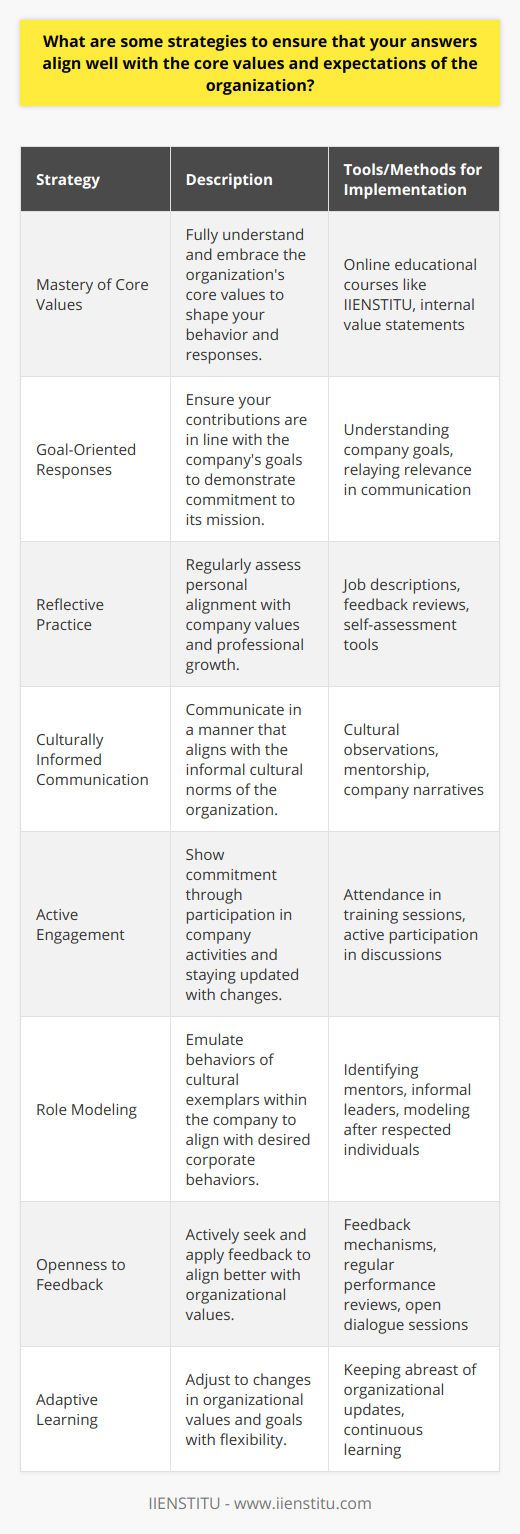
How can an interviewee demonstrate adaptability and a willingness to learn while answering popular interview questions?
Self-Disclosure of Learning Experiences
An interviewee can demonstrate adaptability and an eagerness to learn by sharing past learning experiences. Emphasizing how new skills were acquired in the past shapes the trajectory of how an interviewee can exhibit these traits. This would involve telling stories about how they have integrated new learning into day-to-day work tasks, or how they applied new knowledge to achieve a significant outcome.
Illustrating Adaptability Responding to Challenges
To highlight adaptability, the interviewee can give examples of how they navigated diverse situations to achieve the best result. This will bring to light their capacity to change strategies, tackle unexpected challenges, and meet the changing demands of the work environment. Exhibiting adaptability could also imply showing how they have managed to work under pressure, resolved conflicts, or collaborated with a diverse team.
Articulating Growth Mindset
An effective way to demonstrate a readiness to learn is by conveying a growth mindset. This could mean conveying a genuine curiosity for expanding one's knowledge, expressing excitement about industry advancements, and committing to continuous professional development. An openness to feedback and continuous improvement can also underscore an enduring eagerness to learn.
Emphasizing Past Transitions
Another way to underscore adaptability is by showcasing how one has transitioned between different roles, industries, or environments. Interviewees can underscore their flexibility by highlighting how they have adapted and thrived in unfamiliar situations. A record of successful transitions can also underscore an individual's resilience, creativity, and problem-solving acumen.
Concluding Remarks
In sum, demonstrating adaptability and a readiness to learn in an interview entails highlighting past learning experiences, illustrating adaptability through tackling challenges, embodying a growth mindset, and showcasing successful role transitions. These elements, when deliberately articulated, can have a powerful impact on how an interviewee is perceived in terms of their readiness for new roles and challenges.
